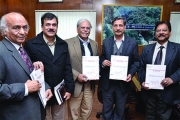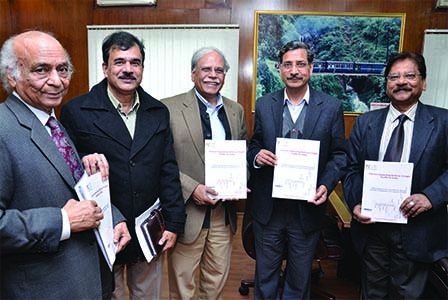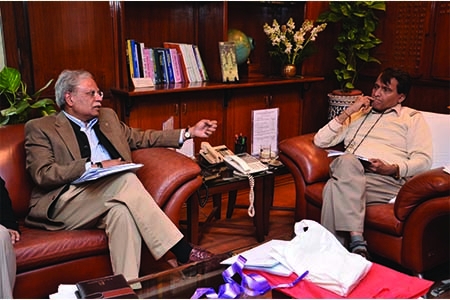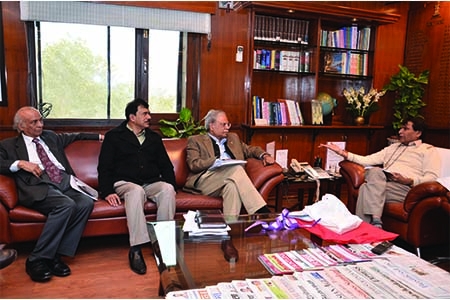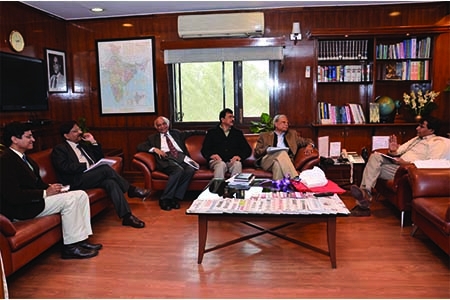NCAER presented its study on Factors Impacting Railway Freight Traffic in India to Mr Suresh Prabhakar Prabhu, Union Minister for Railways, Mr A K Mital, Chairman of the Railway Board, and Mr Mohd. Jamshed, Member Traffic, Railway Board at the Rail Bhavan today. Present were Dr Shekhar Shah, Director-General of NCAER, Dr Saurabh Bandyopadhyay, Associate Fellow and the study’s author, and Dr D B Gupta, Senior Adviser at NCAER.
The bottom line forecast made in NCAER’s study is that Indian Railways freight volume is likely to grow by 2.1 percent in 2016-17, as compared to its 1 percent growth in 2015-16. This doubling of the growth rate is likely to be possible without any major policy shifts. The Railway Board requested NCAER for this short-term study to focus on Indian Railway’s freight business and to identify the reasons for the recent plateauing of its growth to around 1 percent per annum for bulk freight commodities, including coal, iron ore, cement, steel, fertilisers and food-grains, and container traffic.
The NCAER study also estimates the likely volume demand in 2016-17 for railway freight. Freight accounts for nearly two-thirds of IR’s revenue spread over two broad categories, bulk and other goods. Indian Railway’s freight business is estimated to have grown at about 1 percent in 2015-16. The NCAER study finds that there are several reasons for the nearly flat growth in IR’s freight business in 2015-16. The Indian economy has been passing through a difficult and challenging time since 2014-15. Deficient rainfall and two drought years in a row have lowered rural demand. Industry too remains sluggish due to low investment demand. Services, which have been a key driver for growth, have also not remained immune to the slowdown. Alongside industry, growth in gross value added in 2015–16 for the mining and quarrying sector, IR’s largest client, is estimated to be 6.9 per cent as compared to 10.8 percent in 2014–15. Crucial components of core infrastructure, coal, steel, cement, and electricity, also showed a decline in their growth rate for April–December 2015 as compared to their performance in 2014–15.
The study notes a number of commercial, operational and policy-related issues that could have an impact on IR’s freight traffic. Said Dr Shekhar Shah, Director-General of NCAER, “The NCAER study shows that there is tremendous untapped potential for improving IR’s freight business if it can begin to meet the growing competition from the road sector. The railways need to compete on price, punctuality, and predictability, the keys to a successful logistics business.” IR’s freight charges have gone up by 67 percent in the last five years while there has been a decline in fuel prices. Road transport for freight has now become much cheaper than rail. Among the policy reforms suggested by the NCAER study are correcting the fare/freight ratio; providing for periodic reviews of surcharges like the port congestion surcharge and busy season surcharge; steps to encourage short lead traffic; a review of the dual pricing for iron ore; review of transportation product design to cater to market requirements of smaller parcel sizes; and liberalisation of two-point and three-point loading rules. The short-term study did not go into tariff issues, but a longer study is planned in the future to look at tariff, price sensitivity, and cross-subsidization issues.
Dr Saurabh Bandyopadhyay, the author of the NCAER study, noted “The NCAER study provides substantial insights into how the Railways’ freight revenues are closely tied to international and domestic industry developments and the need to track these developments in order to plan strategically for its brighter future.”
In an exclusive interview for a programme titled ‘Ask Rail Mantri’, organised by Ministry of Information & Broadcasting soon after the Rail budget 2016 was presented on 25 February 2016, Mr Suresh Prabhakar Prabhu, Union Minister for Railways quotes this evidence-based NCAER study while discussing the challenges faced by Indian Railways in terms of freight.






